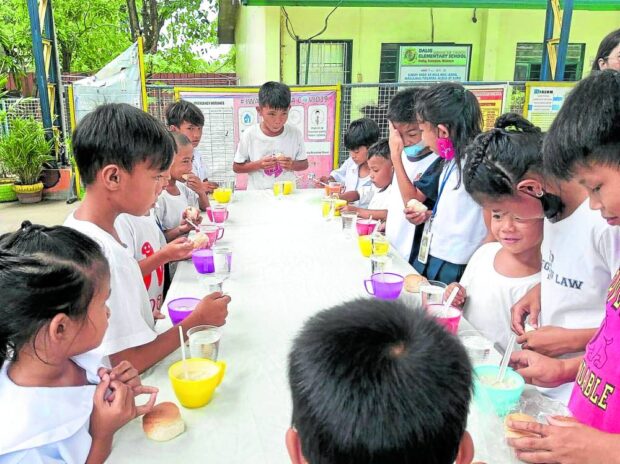
INQUIRER FILE PHOTO
MANILA, Philippines — Next year’s proposed funding for the feeding of children of P15.795 billion is 45 percent higher than this year’s P10.89 billion and may mean 857 million meals for nutritionally deficient kids.
“Never has the budget for child feeding been supersized to this big. On this, the government has put its money where its mouth is,” House Deputy Speaker and Batangas Rep. Ralph Recto said over the weekend, noting that the program was “unprecedented.”
A check of the 2024 National Expenditure Program showed that the Department of Education (DepEd) requested P11.711 billion for its school-based feeding program, while the Department of Social Welfare and Development (DSWD) asked for P4.084 billion for its supplementary feeding program.
These sums are higher than the P5.69 billion and P5.2 billion approved for these programs under the 2023 spending law.
The proposed funding for feeding programs for kids in 2024 is P4.9 billion higher than this year’s approved allocations.
Big catering operation
Recto said the P15.795 billion may translate to 857 million meals for nutritionally deficient children, at current prices.
“Costing for 2024 might still be adjusted to inflation, but it will not change the fact that the two agencies will have in their hands a big catering operation next year,” he said.
Recto cited data from the two agencies, which showed that for 2023, the DepEd will provide 1,678,704 students one meal a day for 120 days, while DSWD will serve one meal for 120 days to 1,754,637 beneficiaries.
The DepEd’s school-based feeding program caters to students from Kindergarten to Grade 6 who come from indigent families and are suffering from child wasting or stunting.
On the other hand, the DSWD’s supplemental feeding program is for children aged 3 to 5 years old who are placed in daycare and other child development centers.
Better canteens sought
Recto said the increase in the budget for school-based feeding should be accompanied by higher funding for food preparation and handling facilities, cooking equipment, and canteens.
“Procuring more of these serves a dual purpose as these facilities can become teaching laboratories for senior high students taking culinary classes under the technical-vocational track. They can feed the body and feed the mind at the same time,” he said.
He added that the P15.795 billion funding for the two agencies may also help local farmers and food producers if schools will buy from them.
“In essence, it is a food purchase budget, which can be spent locally, resulting in a virtuous cycle wherein food grown by the village will end up being consumed by their children,” Recto added.